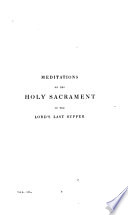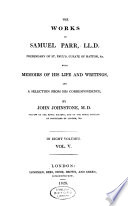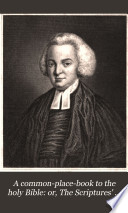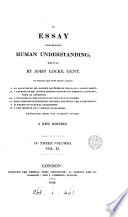 For that which befalleth the sons of men befalleth beasts; even one thing befalleth them: as the one dieth, so dieth the other; yea, they have all one breath; so that a man hath no preeminence above a beast: for all is vanity. All go unto one place; all... For that which befalleth the sons of men befalleth beasts; even one thing befalleth them: as the one dieth, so dieth the other; yea, they have all one breath; so that a man hath no preeminence above a beast: for all is vanity. All go unto one place; all...  Dictionary of the Holy Bible - Página 130por Augustin Calmet - 1832 - 1003 páginasVista completa Dictionary of the Holy Bible - Página 130por Augustin Calmet - 1832 - 1003 páginasVista completa - Acerca de este libro
 | Edward Reynolds (bp. of Norwich.) - 1826 - 944 páginas
...regard of man's future condition, his body is again to be raised, and brought to judgement. Ver. 21. Who knoweth the spirit of man that goeth upward, and the spirit of the beast which goeth downward to the earth.'] It is true indeed there is a future happiness belonging unto men... | |
 | Walter Balfour - 1828 - 374 páginas
...befalleth the sons of men befalleth the beasts ; even one thing befalleth them ; as the one dieth so dieth the other; yea, they have all one breath ; so that a man hath no pre-eminence above a beast ; for all is vanity. All go unto one place; all are of the dust, and all turn to dust again. Who knoweth... | |
 | 844 páginas
...befalleth the sons of men, befalleth beasts ; even one thing befalleth them : as the one dieth, so dieth the other ; yea, they. have all one breath ;...so that a man hath no pre-eminence above a beast." Leo X. who caused the question of the immortality of the soul, to be discussed before him, and concluded... | |
 | David Thom - 1828 - 384 páginas
...which befalleth the sons of men, befalleth beasts, even one thing befalleth them : as the one dieth, so dieth the other ; yea, they have all one breath, so that a man hath no pre-eminence above a beast : for all it vanity. A II go unto one place, all are of the dust, and all turn to dust again. Eeclesiastes... | |
 | Walter Balfour - 1828 - 374 páginas
...befalleth the sons of men befalleth. the beasts; even one thing befalleth them ; as the one dieth so.dieth the other; yea, they have all one breath ,*• so that a man hath no pre-eminence above a beast; for all is vanity. All go unto one place; all are of the dust, and all turn to dust again. Who knoweth... | |
 | Essays - 1828 - 368 páginas
...manner, but the judgment of heavenly reason is inversely similar. In other words, to the former they * " Who knoweth the spirit of man that goeth upward, and the spirit of the beast that goeth downward to the earth ?" Eccles. iii. 21. M are always overhead, but to the latter they are underfoot.... | |
 | Samuel Parr, John Johnstone - 1828 - 734 páginas
...befalleth the sons of men, even one and the same thing befalleth them, as die the one, so the other die ; yea, they have all one breath, so that a man hath no pre-eminence above a beast; for all is vanity." * But to-day, what is the language of our heroic boaster—" John is risen from... | |
 | Samuel Parr, John Johnstone - 1828 - 738 páginas
...befalleth the sons of men, even one and the same thing befalleth them, as die the one, so the other die ; yea, they have all one breath, so that a man hath no pre-eminence above a beast ; for all is vanity." * But to-day, what is the language of our heroic boaster — " John is risen... | |
 | William Dodd - 1828 - 522 páginas
...born, and a time to die, &c. all go unto one place, all are of the dust, and all turn to dust again ; who knoweth the spirit of man that goeth upward, and the spirit of the beast that goeth downward to the earth.— Eccles. iii. 1, 2. 20,21. As he came forth of his mother's womb, naked... | |
 | John Locke - 1828 - 436 páginas
...I translate the Hebrew word mi here, for so I find it translated the very next verse but one ; fwho knoweth the spirit of man that goeth upward, and the spirit of the beast that goeth down to the earth ? In which places it is plain that Solomon applies the word mi, and our translators... | |
| |